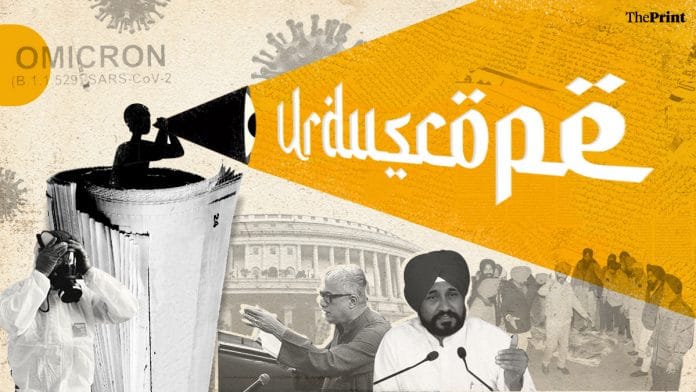New Delhi: The spread of the Omicron variant of Covid-19 in India, the passage of bills during the Winter Session of Parliament, and the lynchings after alleged ‘sacrilege’ incidents in Punjab dominated the Urdu press this week.
ThePrint brings you a round-up of what made it to the front pages and what editorial stances prominent newspapers took.
Omicron variant
On 20 December, Roznama Rashtriya Sahara’s front page carried a report that 12 states, including poll-bound Uttar Pradesh, have reported Omicron cases. Two days later, it reported that the central government is increasing district-level surveillance and testing in view of rising cases.
The front page of Siasat, on 23 December, carried report on research by the Indian Institute of Technology, Kanpur, that Omicron cases in the country will peak in February.
In its editorial on 22 December, Roznama said rallies and processions by political parties ahead of assembly elections in five states could prove to be ‘super spreader’ events and could threaten the ongoing war against Covid, adding that such rallies should be banned. The editorial further said the government should increase the pace of vaccination, decide on giving booster doses, and start vaccinating children soon.
Also read: Omicron drives Indians, especially health workers, to quietly get booster from pvt hospitals
Winter Session of Parliament
On 21 December, the front pages of Inquilab, Roznama and Siasat published the report about the passage of the Election Laws (Amendment) Bill, 2021, in the Lok Sabha.
The front pages of Inquilab and Siasat on 22 December carried reports on the introduction of the Prohibition of Child Marriage (Amendment) Bill, 2021, in the Lok Sabha. In its report, Inquilab said the bill was introduced despite protests from the Opposition and Muslim leaders.
Both Inquilab and Roznama also published the news of the suspension of Trinamool Congress Rajya Sabha MP Derek O’Brien from the Winter Session.
In its editorial ‘Winter Session ki Kaamyabi (Success of the Winter Session)’ on 23 December, Roznama said the government passed several bills during this Parliament session without any debate or discussion. It further said the government, instead of seeking people’s opinion, has imposed its will on them, adding that by passing nine bills, the government may be calling the Winter Session a success, but the truth is that the laws were framed by bypassing the Opposition parties, which isn’t good for democracy.
Siasat, in its editorial on 23 December, said Parliament is a place where important policies are made, but despite that, there is ruckus, and sessions are being postponed, which is sad. This needs attention from both the government and the Opposition and there is a need to discuss who is responsible for wasting the time of the House, it said.
Also read: Aadhaar linkage can sink India’s electoral democracy – with voter profiling, selective exclusion
Urdu classes at DU, Vedas & Bhagavad Gita in history textbooks
On 20 December, Inquilab reported that Urdu as a subject has been removed from five colleges of Delhi University. The report said after the retirement of Urdu teachers in these colleges, permanent vacancies were abolished and the admission of students was also stopped.
The next day, Inquilab published a report on the front page which said the University Grants Commission (UGC) has sought a response from the principals and head of Urdu departments and has also constituted an inquiry committee to look into the matter.
On 23 December, Inquilab’s front page carried a report about the Parliamentary Standing Committee suggesting to the government to include the Vedas and the Bhagavad Gita in the history syllabus in schools. The report said the committee is trying to give saffron color to school syllabus, and ignoring the religious books of Muslims.
Punjab lynchings
On 20 December, the front pages of Inquilab, Roznama and Siasat carried reports on lynching incidents in Punjab after the alleged sacrilege attempts at the Golden Temple in Amritsar and in Kapurthala.
In its editorial the same day, Siasat wrote that the political atmosphere is heating up in Punjab ahead of the assembly elections. It added that in such a situation, an attempt can be made to incite religious sentiments. The editorial further said the government needs to find out whether there is any conspiracy behind such incidents, and that the perpetrators should be exposed and punished so that such incidents do not occur again.
Organisation of Islamic Cooperation meeting
On 20 December, Inquilab, Siasat and Roznama carried reports about the 17th special meeting of the Organisation of Islamic Cooperation (OIC) held in Islamabad, Pakistan, on their front pages. The reports mentioned the steps taken by the countries in this meeting to eliminate Islamophobia.
Also read: Granth Sahib is ‘living Guru’, so BJP wants attempt to murder charge in Punjab ‘sacrilege’ cases






